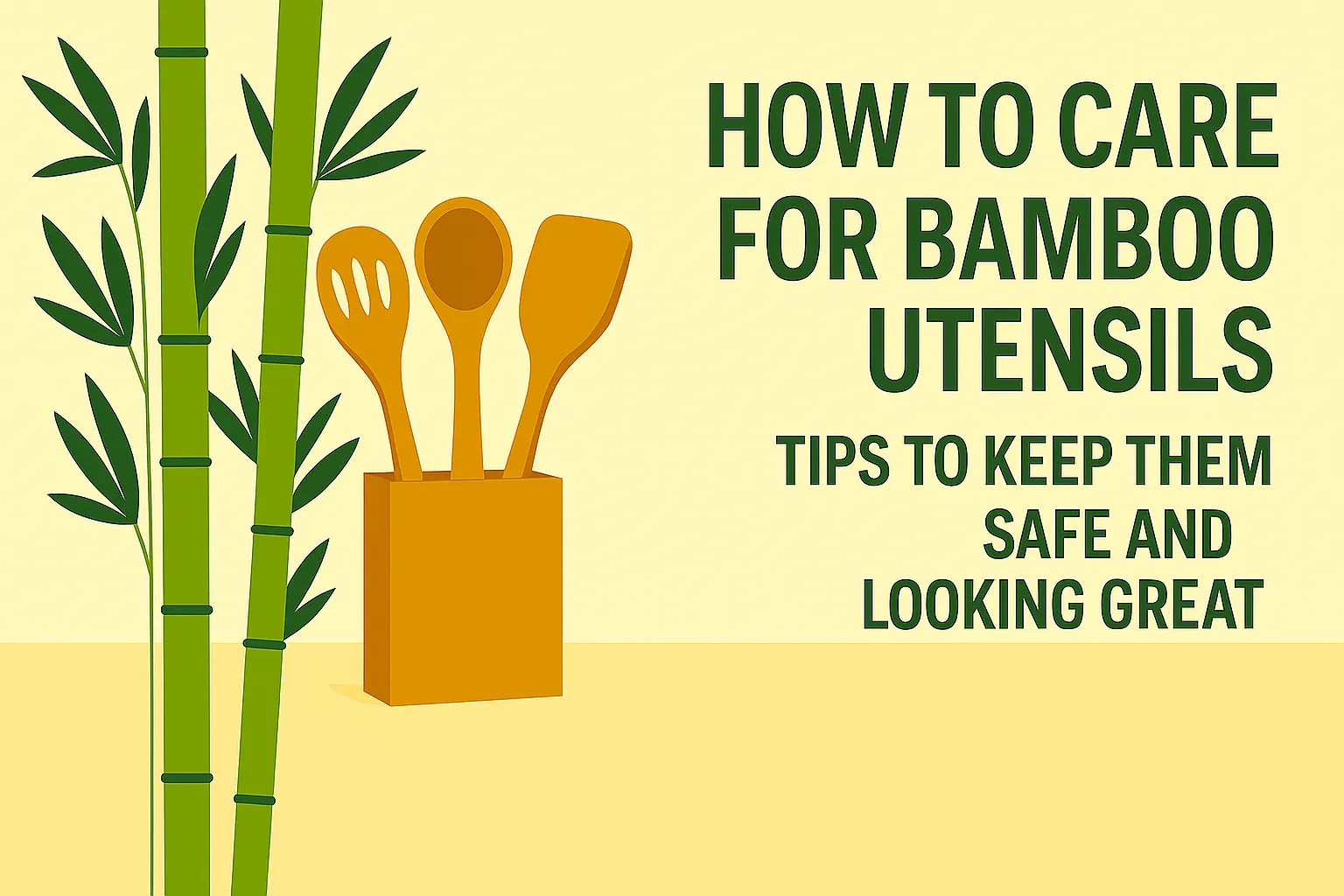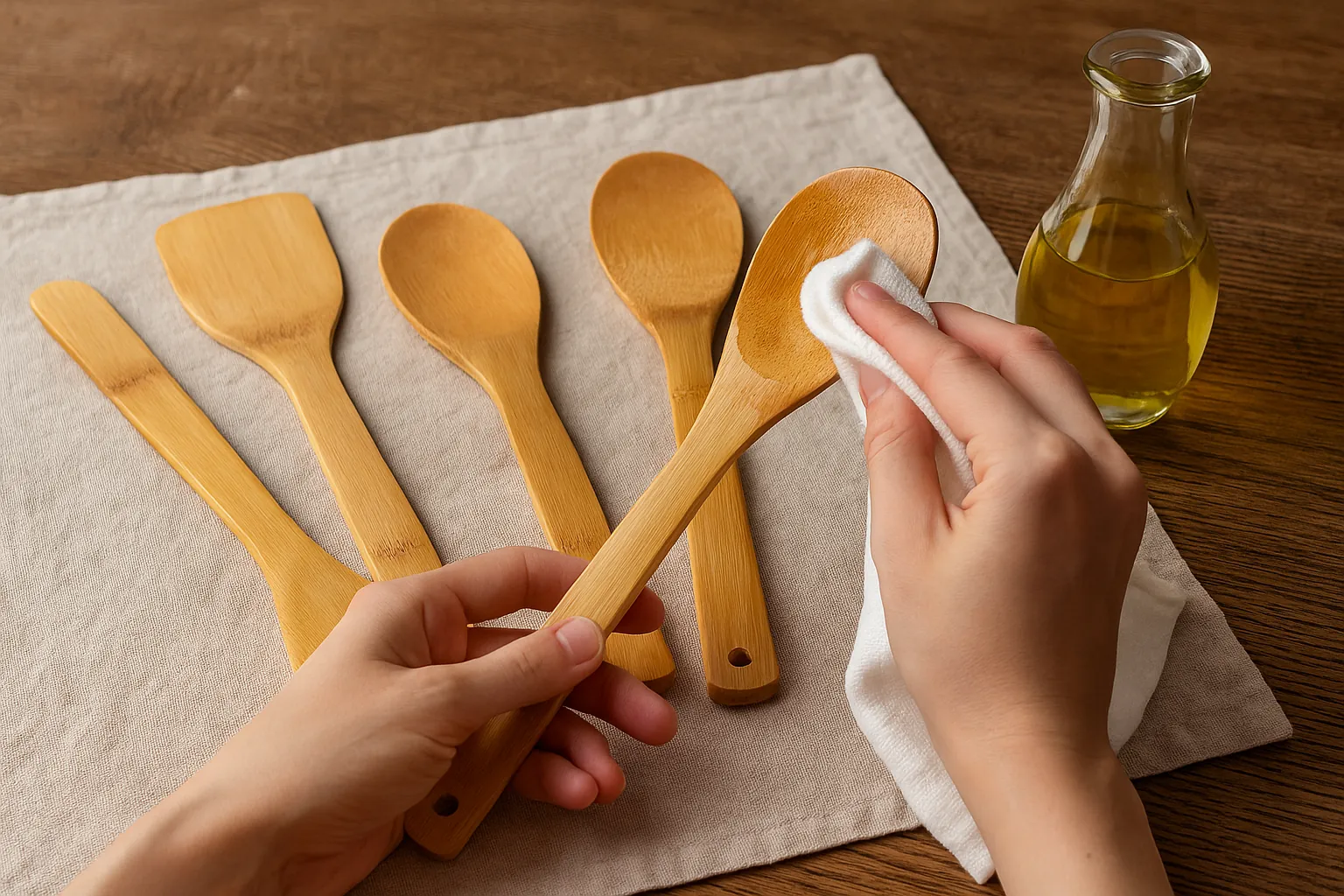Bamboo utensils are one of those small kitchen choices that make life a little nicer. They’re lightweight, easy on your pans, and a more natural option than plastic. But, like any well-loved kitchen tool, they need a bit of care to keep them looking and working their best.
If you’ve ever wondered how to care for bamboo utensils so they last longer and stay safe to use, you’re in the right place. A few simple habits will keep your bamboo cooking utensils in great shape for years. I’ll walk you through it. And if you’re still thinking about adding some to your kitchen, take a look at these bamboo utensils sets to help you choose the right ones.
Table of Contents
How to Care for Bamboo Utensils: Simple Steps for Everyday Use
Not sure how to clean bamboo utensils without damaging them? Don’t worry—it’s easier than you think:
- Always wash by hand with mild dish soap and warm water.
- Rinse right after use, especially if you’ve been cooking with staining foods like curry or tomato sauce.
- Use a soft sponge or cloth. Skip anything abrasive that could rough up the surface.
- Never soak bamboo utensils, even if you’re tempted to loosen stuck-on bits. Soaking can cause swelling and cracking.
- After washing, dry them thoroughly with a towel and let them finish air drying before you store them.
What to Avoid: Common Mistakes That Can Damage Your Utensils
It’s easy to make a few missteps with bamboo if you’re used to tossing things in the dishwasher. Here’s what to steer clear of:
- Dishwashers are a no-go. The heat and steam can warp bamboo and strip away its natural oils.
- No microwaves or ovens. High heat can dry out bamboo, causing cracking or warping.
- Don’t stack wet utensils or keep them in airtight or damp spaces. That’s how you end up with mold.
One quick note: If your new utensils give off a strong chemical smell or have a shiny coating, they may contain adhesives. Stick to utensils labeled as 100% bamboo with food-safe finishes.
Oiling Bamboo Utensils: Keep Them Hydrated and Looking Good
Even with careful washing, bamboo can dry out over time. A quick oiling once a month works wonders:
- Choose a food-safe oil like coconut oil, linseed oil, or a beeswax blend. These eco-friendly options are plant-based and biodegradable. Mineral oil is also effective, but it is petroleum-based, so you may prefer natural oils if sustainability is important to you.
- Skip cooking oils like olive or vegetable oil—they can turn rancid.
- Make sure the utensils are clean and dry first.
- Rub in a thin layer of oil with a soft cloth. Let it soak in for a few hours or overnight.
- Wipe off any excess oil before using them again.
If you live in a dry climate or during winter months, you may want to oil your bamboo utensils a little more often to keep them from drying out.
You’ll notice the bamboo looks richer in color and smoother to the touch after oiling. I’ve found that keeping up with oiling makes a big difference—my older bamboo spoons still feel smooth and look great after years of use.
Cleaning Stains and Odors from Bamboo Cooking Utensils
Bamboo is naturally resistant to bacteria, but it can pick up stains and odors from certain foods. Bamboo naturally contains antibacterial properties, which help keep your utensils safe to use. Regular handwashing and gentle care help preserve this natural benefit—dishwashers and harsh cleaners can strip it away.
If that happens:
- Act fast. Rinse utensils right after use if you’ve been cooking with highly pigmented foods.
- For stubborn stains, make a paste with baking soda and lemon juice or vinegar. Gently scrub with a soft cloth, rinse well, and dry.
- If an odor lingers, try a short vinegar-water soak (about 5 minutes), then rinse and dry thoroughly.
Regular oiling also helps make the bamboo surface less prone to absorbing stains and smells.
When to Replace Bamboo Utensils
Even well-cared-for bamboo won’t last forever. You’ll know it’s time to replace your utensils if you notice:
- Deep cracks or splits
- Splintering that doesn’t smooth out with light sanding
- Rough spots that catch on your sponge or cloth
- Stains or odors that won’t go away, even after cleaning
With proper care, bamboo utensils can last several years.
Storing Bamboo Utensils: Help Them Stay in Top Shape
Proper storage makes a big difference:
- Keep utensils upright in a well-ventilated holder, not packed tightly in a drawer.
- Avoid direct sunlight and heat sources (like next to the stove). Sunlight can cause bamboo to fade and dry out, making it more prone to cracking over time.
- Don’t store them damp—always make sure they are completely dry first.
These small habits will go a long way in keeping your utensils looking and performing their best.
Bamboo Utensils vs Other Common Kitchen Utensils: Care Differences

Wondering why bamboo utensils need this kind of care? Here’s a quick comparison to show how they differ from other common kitchen utensils:
| Feature | Bamboo Utensils | Wooden Utensils | Plastic Utensils | Metal Utensils |
|---|---|---|---|---|
| Dishwasher safe? | ❌ No | ❌ No | ✅ Usually | ✅ Usually |
| Hand wash required? | ✅ Yes | ✅ Yes | Optional | Optional |
| Requires oiling? | ✅ Yes (monthly) | ✅ Yes (monthly) | ❌ No | ❌ No |
| Sensitive to heat? | ✅ Yes | ✅ Yes | ✅ Some types | ❌ No |
| Prone to staining? | ✅ Some foods may stain | ✅ Some foods may stain | ✅ Some plastics stain | ❌ No |
| Prone to odor absorption? | ✅ Possible if not cleaned | ✅ Possible if not cleaned | ✅ Possible | ❌ No |
| Compostable at end of life? | ✅ Yes | ✅ Yes | ❌ No | ❌ No |
Quick Care Checklist
Here’s a quick refresher to keep handy—trust me, your bamboo utensils will thank you for it:
- ✅ Hand wash only
- ✅ Never soak
- ✅ Dry thoroughly after washing
- ✅ Oil monthly
- ✅ Store upright in a dry, airy place
- ✅ Replace when damaged or overly worn
Frequently Asked Questions
- Are bamboo utensils dishwasher safe? No. The heat and moisture in dishwashers will warp, crack, or dry out bamboo. Always hand wash them instead.
- How do you clean bamboo utensils? Wash by hand using warm water and mild soap. Rinse well, dry thoroughly, and never soak them in water.
- What oil to use on bamboo utensils? Coconut oil, linseed oil, beeswax blends, or food-safe mineral oil all work well. Stick to natural oils if you prefer an eco-friendly option.
- Can bamboo utensils be washed? Yes — just not in the dishwasher. Handwashing with a soft sponge and mild soap works best.
- Do you need to season bamboo utensils? Not quite like cast iron, but regular oiling helps keep the bamboo from drying out or cracking. It’s like giving them a little moisture boost.
- Are bamboo utensils antibacterial? Yes, bamboo has natural antibacterial properties. Handwashing helps preserve this benefit better than harsh detergents or high heat.
- Can you use bamboo utensils on nonstick cookware? Absolutely. Bamboo won’t scratch nonstick pans, so it’s a great choice if you want to protect your cookware.
- How do you keep bamboo utensils from molding? Always dry them completely before storing. Don’t soak them or leave them in damp drawers.
- Are bamboo utensils healthy? Yes. They’re made from natural materials without plastic coatings. Just check that they’re food-safe and uncoated.
- Can you use olive oil on bamboo? It’s not recommended. Olive oil can turn rancid. Stick with coconut, linseed, beeswax blends, or mineral oil.
- How long do bamboo utensils last? With proper care, they usually last 2 to 5 years, sometimes longer. Oil them regularly and clean them gently to stretch their lifespan.
- When should you replace bamboo utensils? If they’re cracked, splintering, or holding on to smells and stains that won’t go away, it’s time to let them go.
Keep Your Bamboo Utensils Beautiful and Safe for Years
Caring for bamboo utensils takes just a few extra steps—but it’s worth it. With regular cleaning, drying, oiling, and proper storage, your utensils will stay safe and beautiful for years of use.
And when they finally wear out? You can compost bamboo utensils, as long as they’re free of synthetic coatings. It’s a simple way to keep your kitchen greener.
If you’re curious about which bamboo utensils are worth trying, take a look at my bamboo utensils guide—you’ll find some great options there.

Kristin is the founder of Eco Bamboo Living. She shares honest, research-backed guides and product reviews to help readers find bamboo products that are truly sustainable, practical, and worth bringing into their homes.

